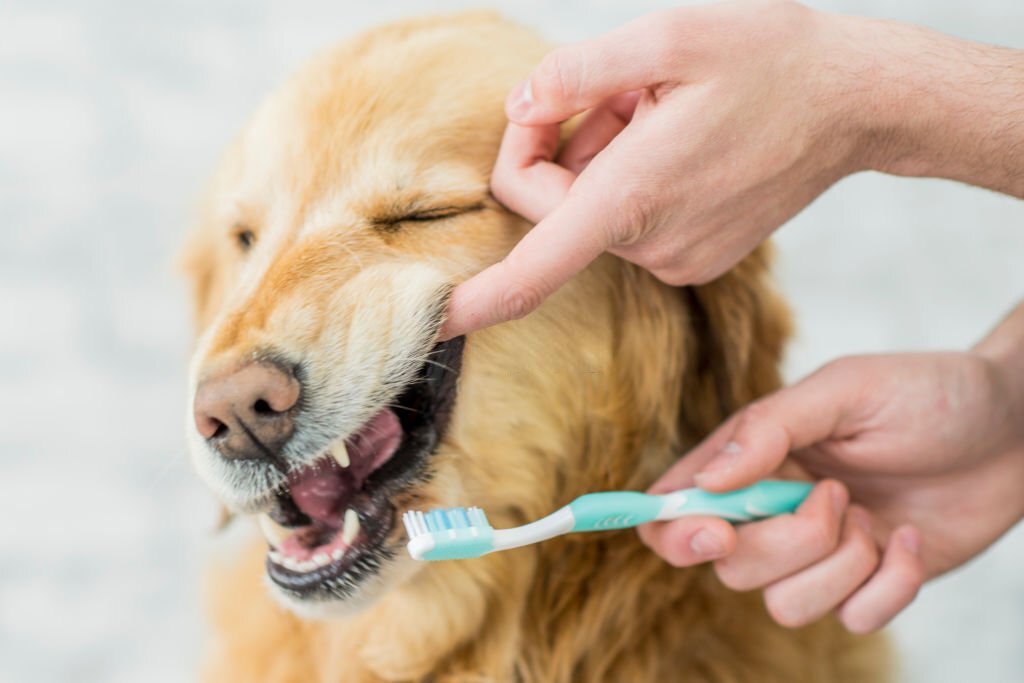Introduction
Dental care is an essential aspect of your puppy’s overall health and well-being. Just like humans, puppies need regular dental care to maintain healthy teeth and gums. Neglecting your puppy’s dental health can lead to a range of dental problems, including tooth decay, gum disease, and bad breath. In this post, we will discuss the importance of dental care for puppies and provide tips on how to maintain your puppy’s dental health.

Why Brushing Your Puppy’s Teeth is Important
Regular toothbrushing is essential for maintaining your puppy’s dental health. Brushing your puppy’s teeth helps to remove plaque and tartar buildup, which can lead to tooth decay and gum disease. It also helps to freshen your puppy’s breath and prevent bad breath. Neglecting your puppy’s dental health can lead to a range of dental problems, including tooth decay, gum disease, and bad breath.
Not brushing your puppy’s teeth can also lead to more serious health problems. Bacteria from dental problems can enter your puppy’s bloodstream and cause infections in other parts of the body, including the heart, liver, and kidneys. Regular toothbrushing can help to prevent these health problems and keep your puppy healthy.
When to Start Brushing Your Puppy’s Teeth
It is important to start brushing your puppy’s teeth as early as possible. Ideally, you should start brushing your puppy’s teeth when they are still a puppy. This will help them get used to the process and make it easier to maintain their dental health as they grow older.
If you adopt an older puppy or adult dog, it is still important to start brushing their teeth as soon as possible. It may take some time for them to get used to the process, but with patience and persistence, you can help them maintain healthy teeth and gums.
Choosing the Right Toothbrush and Toothpaste for Your Puppy
There are several types of toothbrushes and toothpastes available for puppies. When choosing a toothbrush, look for one that is specifically designed for puppies. These toothbrushes are smaller and softer than adult toothbrushes, making them more comfortable for your puppy.
When choosing a toothpaste, look for one that is specifically designed for puppies. These toothpastes are safe for your puppy to swallow and come in flavors that your puppy will enjoy, such as chicken or beef.
How to Introduce Your Puppy to Toothbrushing
It is important to introduce toothbrushing gradually to your puppy. Start by letting your puppy smell and taste the toothpaste. Then, gently rub the toothpaste on your puppy’s teeth and gums with your finger. Gradually introduce the toothbrush, starting with just a few teeth at a time. Be patient and gentle, and reward your puppy with praise and treats.
Step-by-Step Guide to Brushing Your Puppy’s Teeth
To brush your puppy’s teeth, follow these steps:
1. Hold your puppy’s head steady with one hand and use the other hand to brush their teeth.
2. Gently lift your puppy’s lip to expose their teeth and gums.
3. Place the toothbrush at a 45-degree angle to your puppy’s teeth and brush in a circular motion.
4. Brush the outer surfaces of your puppy’s teeth, then the inner surfaces, and finally the chewing surfaces.
5. Be sure to brush your puppy’s back teeth, as these are the most prone to plaque and tartar buildup.
6. Brush for at least two minutes, twice a day.
Tips for Making Toothbrushing a Positive Experience for Your Puppy
To make toothbrushing a positive experience for your puppy, try the following tips:
1. Use a toothpaste that your puppy enjoys.
2. Reward your puppy with praise and treats.
3. Make toothbrushing a part of your puppy’s daily routine.
4. Be patient and gentle.
5. Use a toothbrush that is comfortable for your puppy.
How Often Should You Brush Your Puppy’s Teeth?
You should brush your puppy’s teeth at least twice a day, just like you brush your own teeth. However, some puppies may require more frequent toothbrushing, depending on their dental health. Talk to your veterinarian about how often you should brush your puppy’s teeth.
Signs of Dental Problems in Puppies and How to Prevent Them
Common signs of dental problems in puppies include bad breath, swollen or bleeding gums, loose or missing teeth, and difficulty eating. To prevent dental problems, brush your puppy’s teeth regularly, provide them with
and toys, and take them for regular veterinary checkups.
Other Dental Care Tips for Your Puppy
In addition to regular toothbrushing, there are several other things you can do to maintain your puppy’s dental health. These include providing them with dental chews and toys, feeding them a healthy diet, and taking them for regular veterinary checkups.
Conclusion
Dental care is an essential aspect of your puppy’s overall health and well-being. Regular toothbrushing, along with other dental care tips, can help to prevent dental problems and keep your puppy healthy. By prioritizing your puppy’s dental health, you can help them live a happy and healthy life.